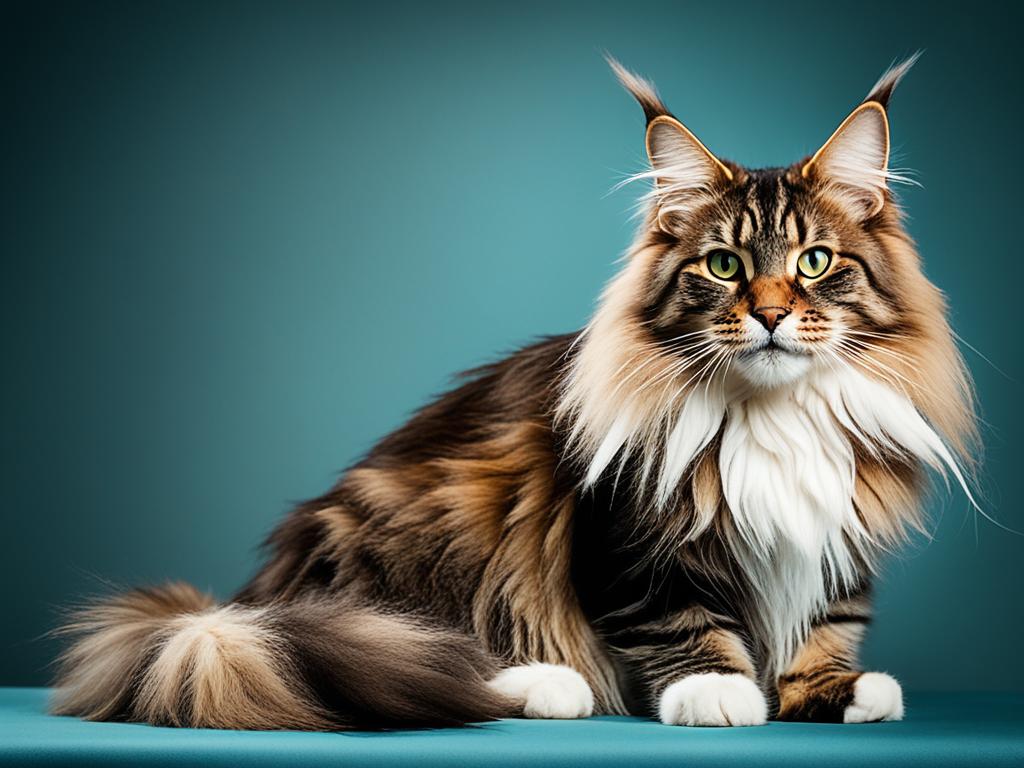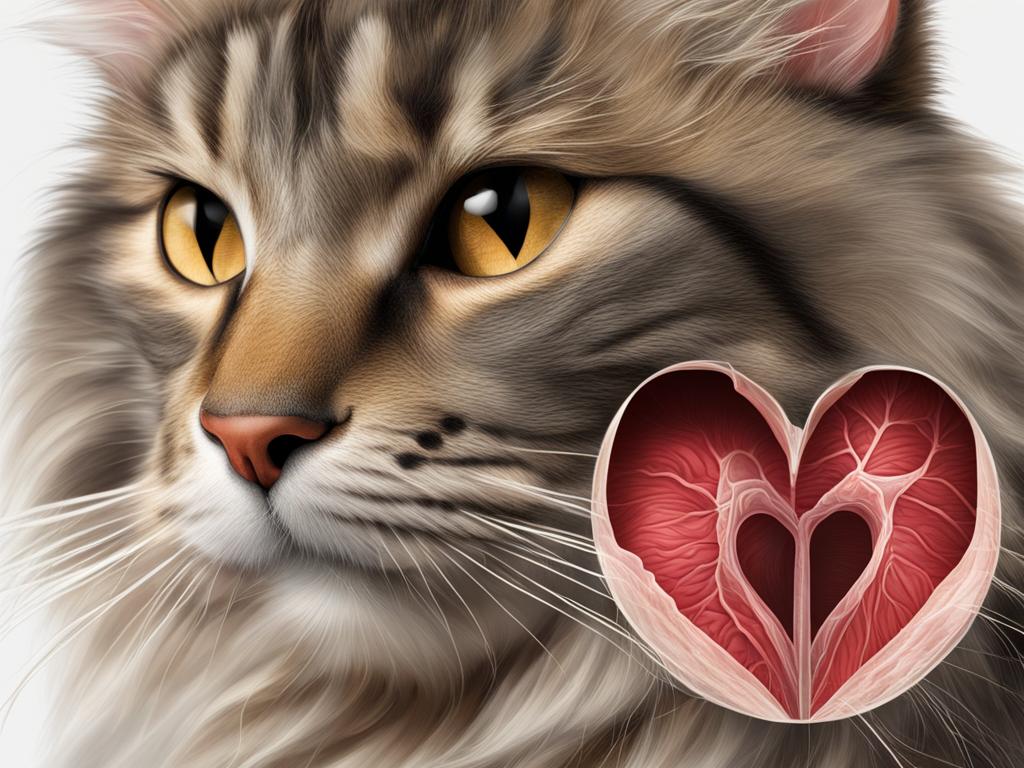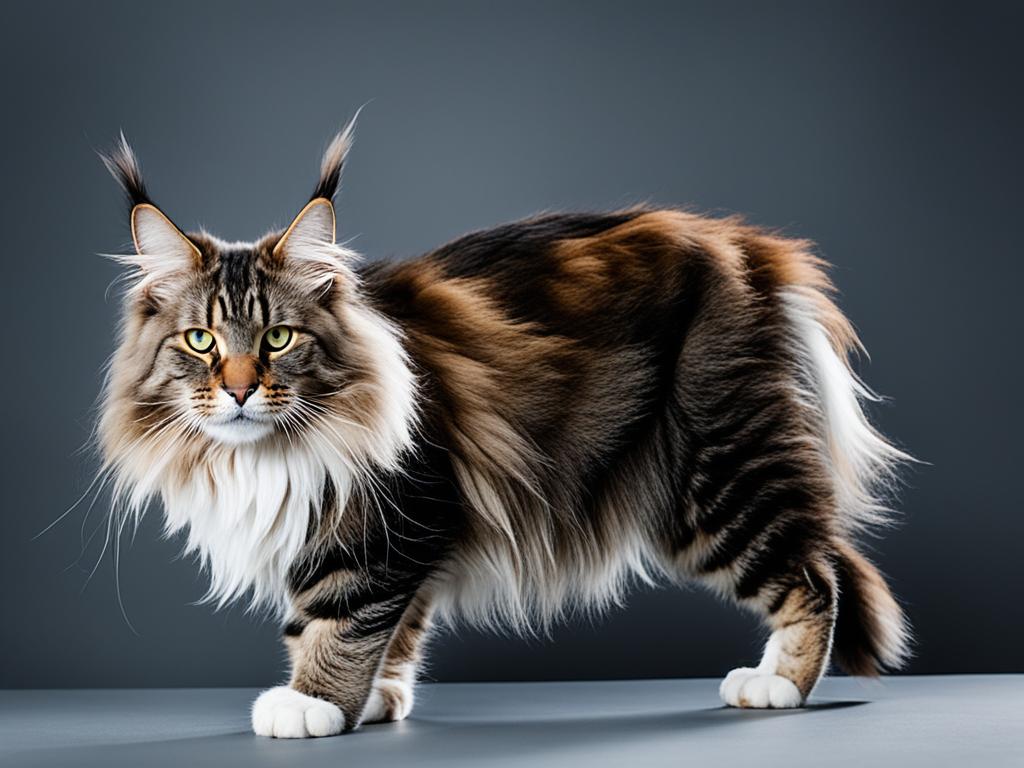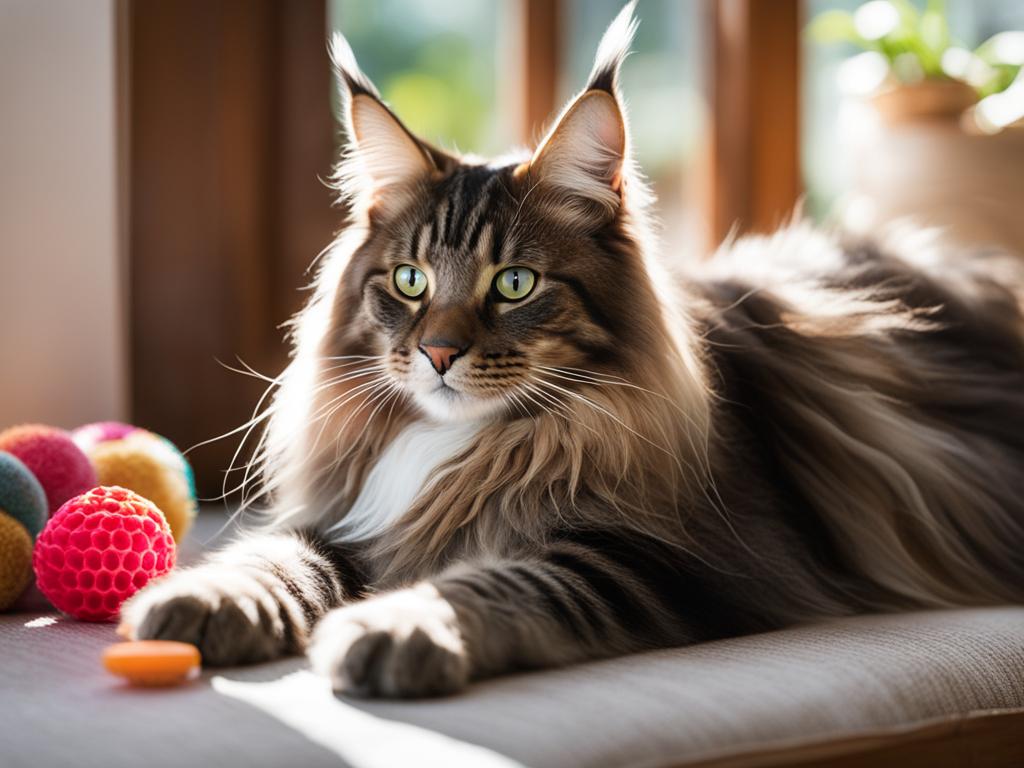When it comes to Maine Coon cats, their friendly and long-haired nature is well-known. However, it’s important to be aware that these majestic felines are also susceptible to certain health issues due to their genetic predisposition. By understanding and addressing these concerns, you can ensure the overall health and well-being of your beloved Maine Coon cat.
Key Takeaways:
- Maine Coon cats are genetically prone to specific health issues.
- By understanding and being proactive, you can protect your Maine Coon’s health.
- Regular check-ups, grooming, exercise, and proper nutrition are crucial for their well-being.
- Specific hereditary health problems in Maine Coons include spinal muscular atrophy, hypertrophic cardiomyopathy, hip dysplasia, stomatitis, and polycystic kidney disease.
- Early detection, treatment, and appropriate management are essential in addressing these health issues.
Common Hereditary Health Problems in Maine Coons
Maine Coon cats, like any other breed, are prone to certain hereditary health issues. Being aware of these conditions is crucial for ensuring the well-being of your beloved Maine Coon. Here are some common hereditary health problems that Maine Coons may face:
1. Spinal Muscular Atrophy (SMA)
Maine Coons can inherit spinal muscular atrophy, a genetic disease affecting the nerves that control muscle movement. Kittens born with SMA may experience muscle weakness, tremors, and abnormal posture. Although there is no cure, proper care and management can improve their quality of life.
2. Hypertrophic Cardiomyopathy (HCM)
Hypertrophic cardiomyopathy is a prevalent heart disease in Maine Coons. It causes the thickening of the heart walls, leading to poor blood circulation and potentially life-threatening complications. Regular cardiac ultrasounds and genetic testing are vital for early detection and monitoring. Treatment options include medication and dietary changes.
3. Hip Dysplasia
Hip dysplasia is an orthopedic condition where the hip joint doesn’t develop properly. Maine Coons with hip dysplasia may experience pain and difficulty while walking. Timely detection through x-rays and appropriate treatment, such as medication or surgery, can enhance their quality of life.
4. Stomatitis
Maine Coon cats can suffer from stomatitis, a condition characterized by inflammation in the mouth. Stomatitis can be triggered by viruses, inflammatory conditions, or dental problems. Symptoms may include drooling, loss of appetite, and bad breath. Treatments vary from cold laser therapy to dental care and, in severe cases, tooth extraction.
5. Polycystic Kidney Disease (PKD)
Polycystic kidney disease is a hereditary condition where fluid-filled cysts form in the kidneys, impacting their function. This disease can lead to kidney failure if left untreated. Increased thirst, weight loss, and frequent urination are common symptoms. Regular check-ups, a balanced diet, and medication can help manage PKD and slow its progression.
Even though Maine Coons may be susceptible to these hereditary health problems, it’s important to remember that not all individuals will develop them. Regular veterinary check-ups, genetic testing, and early intervention can significantly improve your Maine Coon’s quality of life and overall health.
Spinal Muscular Atrophy (SMA) in Maine Coons
Maine Coon cats can be affected by a genetic disease called spinal muscular atrophy (SMA), which impacts the nerves responsible for muscle movement. This condition typically presents itself in kittens and can lead to a range of symptoms, including muscle weakness, tremors, and abnormal posture.
SMA is a progressive disease that currently has no cure. However, with proper care and management, the quality of life for affected Maine Coon cats can be improved.
Symptoms of SMA in Maine Coons:
- Muscle weakness
- Tremors
- Abnormal posture
Recognizing these symptoms early on is crucial in order to provide appropriate care and support to affected cats.
Treatment for Spinal Muscular Atrophy:
While there is no cure for SMA, there are steps you can take to manage the condition and optimize your Maine Coon cat’s well-being. This may include:
- Providing a comfortable and supportive environment
- Assisting with mobility through physical therapy and exercises tailored to their abilities
- Ensuring a balanced and nutritious diet
- Regular veterinary check-ups to monitor the progression of the disease
By implementing these measures, you can help your Maine Coon cat with SMA live a fulfilling and comfortable life.

Hypertrophic Cardiomyopathy (HCM) in Maine Coons
Hypertrophic cardiomyopathy (HCM) is a common heart disease that affects Maine Coon cats. This condition occurs when the walls of the heart become thickened, leading to poor blood circulation and potentially fatal complications. Maine Coon cats are genetically predisposed to developing HCM, and it is important for cat owners to be aware of the signs and symptoms.
Early detection is crucial for effective management of HCM in Maine Coons. Regular cardiac ultrasounds and genetic testing can help identify the presence of HCM and monitor its progression. These diagnostic procedures allow veterinarians to assess the thickness of the heart walls and detect any abnormalities.
Some of the signs that may indicate the presence of HCM in Maine Coon cats include:
- Difficulty breathing
- Coughing
- Reduced energy levels
- Fainting or sudden collapse
- Irritability or aggression
If you notice any of these symptoms in your Maine Coon, it is crucial to seek veterinary attention promptly. Treatment options for HCM focus on managing the symptoms and improving the overall heart function.
Medication: Your veterinarian may prescribe medications to help regulate your cat’s heart function and manage symptoms.
Dietary Changes: A special diet may be recommended to support your Maine Coon’s heart health and overall well-being. This may involve reducing sodium intake and providing a balanced and nutritious diet.
Regular monitoring and follow-up appointments with your veterinarian are essential for cats diagnosed with HCM. By working closely with your veterinarian and implementing appropriate treatment measures, you can help ensure the best possible quality of life for your Maine Coon with HCM.

Hip Dysplasia in Maine Coons
Hip dysplasia is a common orthopedic condition that can affect Maine Coon cats. This condition occurs when the hip joint develops abnormally, causing pain and discomfort for affected cats. While hip dysplasia is more commonly seen in large breeds, Maine Coons are not immune to it.

Early detection is key to managing hip dysplasia in Maine Coons. Some common symptoms to watch out for include:
- Limping or lameness in the hind limbs
- Difficulty in standing up or jumping
- Pain or discomfort during physical activity
- Narrow stance or abnormal gait
If you notice any of these symptoms in your Maine Coon cat, it is important to consult with your veterinarian. They can perform a thorough examination and may recommend diagnostic tests such as x-rays to confirm the presence of hip dysplasia.
Treatment for Hip Dysplasia
While there is no cure for hip dysplasia, there are treatment options available to help manage and improve the quality of life for cats with this condition. The specific treatment plan will depend on the severity of the dysplasia and the individual cat’s needs. Some common treatment options include:
- Weight management: Maintaining a healthy weight can help reduce the strain on the hip joints and alleviate symptoms.
- Medications: Nonsteroidal anti-inflammatory drugs (NSAIDs) may be prescribed to help manage pain and inflammation.
- Physical therapy: Rehabilitation exercises and physical therapy techniques can help strengthen the muscles and improve joint function.
- Surgery: In severe cases, surgical intervention may be necessary to correct the structural abnormalities in the hip joint.
Remember, early detection and appropriate treatment are crucial in managing hip dysplasia in Maine Coon cats. By working closely with your veterinarian, you can help ensure your cat leads a comfortable and active life.
Stomatitis in Maine Coons
Stomatitis is a common condition that causes painful inflammation in the mouth of Maine Coon cats. This oral health issue can significantly impact a cat’s quality of life and overall well-being. It is essential for cat owners to be aware of the symptoms and treatment options available for stomatitis in Maine Coons.
Symptoms of Stomatitis in Maine Coons
The symptoms of stomatitis can vary from cat to cat, but common signs to watch for include:
- Oral discomfort: Cats with stomatitis may exhibit signs of pain or discomfort, such as pawing at the mouth or drooling excessively.
- Bad breath: Foul-smelling breath can be an indication of stomatitis in Maine Coons.
- Loss of appetite: Cats with stomatitis may have difficulty eating or show a decreased interest in food.
If you notice any of these symptoms in your Maine Coon cat, it is essential to consult a veterinarian for a proper diagnosis and treatment plan.
Treatment for Stomatitis
Treating stomatitis in Maine Coons requires a comprehensive approach to manage pain and reduce inflammation. Treatment options may include:
- Cold laser therapy: This non-invasive treatment involves using low-level lasers to stimulate healing and reduce pain and inflammation in the mouth.
- Dental care: Regular dental cleanings and proper oral hygiene can help manage stomatitis and prevent further complications.
- Medications: Your veterinarian may prescribe pain relievers or anti-inflammatory drugs to alleviate symptoms and improve your cat’s comfort.
- Tooth extraction: In severe cases of stomatitis, tooth extraction may be necessary to control infection and eliminate the source of inflammation.
Each cat is unique, and the treatment plan for stomatitis may vary based on the severity of the condition and individual cat’s needs. Close collaboration with a veterinarian is crucial to ensure the best possible outcome for your Maine Coon cat.
With proper management and timely intervention, cats with stomatitis can lead comfortable lives. If you suspect your Maine Coon may be affected by stomatitis, consult your veterinarian for a thorough evaluation and guidance on the most appropriate treatment options.
Polycystic Kidney Disease (PKD) in Maine Coons
Polycystic kidney disease (PKD) is a hereditary condition that commonly affects Maine Coon cats. This condition causes the formation of cysts in the kidneys, which can impede their function and lead to kidney failure if left untreated.
Recognizing the symptoms of PKD is crucial in ensuring early detection and intervention. Some common symptoms of PKD in Maine Coons include:
- Increased thirst
- Weight loss
- Frequent urination
If you notice any of these symptoms in your Maine Coon, it’s essential to consult with a veterinarian. They can perform diagnostic tests, such as ultrasounds and genetic screening, to confirm the presence of PKD.
While there is no cure for PKD, various treatment options can help manage the disease and slow its progression. These may include:
- Prescription medications to control symptoms and support kidney function
- A balanced diet that supports kidney health
- Regular check-ups and monitoring to assess the progression of the disease
Early intervention and ongoing management can significantly improve the quality of life for Maine Coon cats affected by PKD. By working closely with your veterinarian and following their recommended treatment plan, you can help alleviate symptoms and provide the best possible care for your furry friend.
Image:
Maintaining Overall Health in Maine Coons
In addition to managing specific health issues, there are general measures you can take to maintain your Maine Coon cat’s overall health. Regular grooming, exercise, proper nutrition, and preventive care are all vital in ensuring the well-being of your feline companion.
Grooming your Maine Coon cat is an essential part of their care routine. Their long, luxurious fur requires regular brushing to prevent matting and tangling. Not only does grooming help keep their coat looking beautiful, but it also promotes healthy skin and reduces the risk of hairballs. Make sure to use a comb or brush specifically designed for long-haired cats to avoid discomfort or skin irritation.
Exercise is another crucial aspect of Maine Coon cat care. These active and playful cats enjoy interactive and stimulating activities. Provide them with toys, scratching posts, and climbing structures to keep them entertained and physically active. Engaging in regular play sessions with your Maine Coon cat not only helps them burn off excess energy but also promotes muscle tone and mental stimulation.
Proper nutrition plays a significant role in the overall health of your Maine Coon cat. Ensure they have access to a balanced and nutritious diet specifically formulated for their breed’s unique dietary requirements. Maine Coon cats are prone to obesity, so it is essential to monitor their food intake and provide appropriate portion sizes. Consult with your veterinarian to determine the best diet plan for your Maine Coon cat based on their age, weight, and specific health needs.
Lastly, preventive care is crucial in maintaining your Maine Coon cat’s health. Schedule regular veterinary check-ups to monitor their well-being, receive necessary vaccinations, and address any potential health concerns. These routine visits allow your veterinarian to detect and treat any issues early on, increasing the chances of successful interventions and ensuring a long and healthy life for your beloved Maine Coon cat.
FAQ
What are the common health problems in Maine Coon cats?
Maine Coon cats are genetically predisposed to certain health issues including spinal muscular atrophy, hypertrophic cardiomyopathy, hip dysplasia, stomatitis, and polycystic kidney disease.
What is spinal muscular atrophy (SMA) in Maine Coons?
Spinal muscular atrophy is a genetic disease that affects the nerves controlling muscle movement in Maine Coon cats, typically manifesting in kittens. It can cause symptoms such as muscle weakness, tremors, and abnormal posture.
How is spinal muscular atrophy (SMA) in Maine Coons treated?
While there is no cure for SMA in Maine Coons, proper care and management can help improve the quality of life for affected cats.
What is hypertrophic cardiomyopathy (HCM) in Maine Coons?
Hypertrophic cardiomyopathy is a common heart disease in Maine Coon cats, causing the walls of the heart to thicken and leading to poor blood circulation and potentially fatal complications.
What are the signs of hypertrophic cardiomyopathy (HCM) in Maine Coons?
Signs of HCM in Maine Coons may include difficulty breathing, coughing, lethargy, and sudden collapses.
How is hypertrophic cardiomyopathy (HCM) in Maine Coons treated?
Regular cardiac ultrasounds and genetic testing are important for early detection and monitoring of HCM. Treatment options can include medication and dietary changes.
What is hip dysplasia in Maine Coons?
Hip dysplasia is an orthopedic condition that affects the hip joint in Maine Coon cats, causing pain and difficulty in walking.
What are the symptoms of hip dysplasia in Maine Coons?
Symptoms of hip dysplasia in Maine Coons can include limping, difficulty jumping, and hind limb weakness.
How is hip dysplasia in Maine Coons treated?
Early detection through x-rays and appropriate treatment, such as medications or surgery, can help improve the quality of life for cats with hip dysplasia.
What is stomatitis in Maine Coons?
Stomatitis is a condition that causes painful inflammation in the mouth of Maine Coon cats, often caused by viruses, inflammatory conditions, or dental issues.
What are the symptoms of stomatitis in Maine Coons?
Symptoms of stomatitis in Maine Coons may include drooling, loss of appetite, and bad breath.
How is stomatitis in Maine Coons treated?
Treatment options for stomatitis can include cold laser therapy, dental care, and, in severe cases, tooth extraction.
What is polycystic kidney disease (PKD) in Maine Coons?
Polycystic kidney disease is a hereditary condition that causes cysts to form in the kidneys of Maine Coon cats, potentially leading to kidney failure if left untreated.
What are the symptoms of polycystic kidney disease (PKD) in Maine Coons?
Symptoms of PKD in Maine Coons may include increased thirst, weight loss, and frequent urination.
How is polycystic kidney disease (PKD) in Maine Coons treated?
Regular check-ups, a balanced diet, and medication can help manage PKD and slow its progression in Maine Coons.
How can I maintain the overall health of my Maine Coon cat?
Maintaining the overall health of a Maine Coon cat involves regular grooming, providing ample exercise, ensuring proper nutrition, and seeking preventive care through vaccinations and regular check-ups.

Leave a Reply